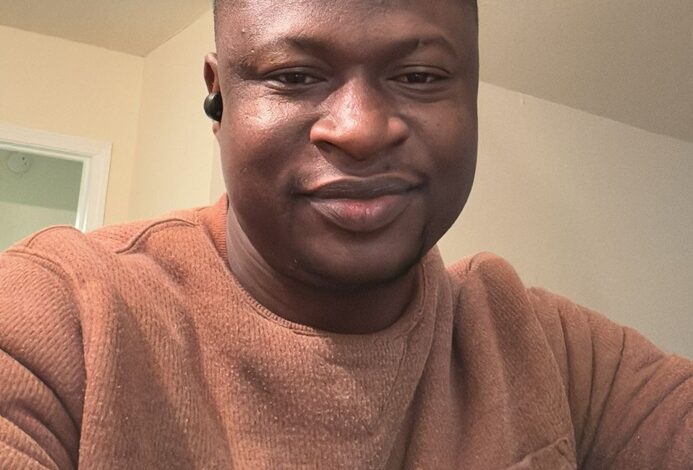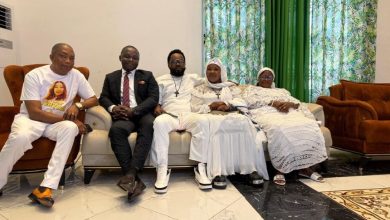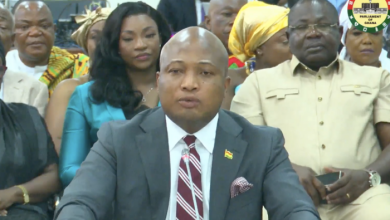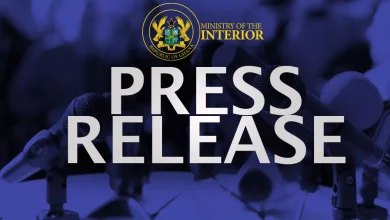Ghanaian Data Analyst Discusses Galamsey; Calls For Action From Politicians, Environmentalists To Stem the Canker

Mr Nicholas Donkor, Ghanaian Data Analyst and Politician
Mr Nicholas Donkor, US-based Ghanaian Data Analyst has called on politicians and environmentalists to collaborate to stem the activities of illegal mining popularly termed as “galamsey”.

According to him, illegal mining is both political as well as environmental issue since the actions of both persons could help halt the devastation going on in the country.
He argues that over the years people including politicians who have involved themselves in the menace have benefitted from the illegal activity.
This, he noted makes it difficult to leave the fight against illegal mining for politicians alone to deal with since they are complicit.
In a well written article, Mr Donkor argues for the active involvement of environmental organisations and persons so as to mirror the ills of the illegal activity.
He states that many were contracting diseases from the illegal activity, adding that research proves that deformities have been found in children in areas where galamsey is prevalent.
Statement From Nicholas Donkor, Data Analyst:
Background:
Politics Destroying everything in Ghana, the story of Galamsey and Ghanaian Politicians.
The fight against galamsey is as much a political struggle as it is an environmental or social one.
Over the years, the issue has been deeply entangled with political interests, often making enforcement inconsistent and selective.
Politicians, especially during election seasons, tend to avoid taking firm stances against illegal mining for fear of losing votes, particularly in mining-dominated constituencies where local livelihoods depend heavily on small-scale gold extraction (galamsey).
Some political actors have even been accused of directly or indirectly supporting galamsey operations in exchange for electoral support or financial backing (Ayee et al., 2011).
Fight against Galamsey:
Despite the formation of anti-galamsey task forces such as Operation Vanguard, the influence of political powerbrokers has often undermined their effectiveness.
In some cases, seized mining equipment mysteriously disappears, and arrested individuals are released without prosecution.
These actions erode public trust in the government’s commitment to curbing illegal mining and send a dangerous message that some people are above the law.
Civil society organizations and the media have consistently called for greater transparency and political will, arguing that without it, all technical or security interventions will fall short.
Politicisation:
The politicization of galamsey also affects inter-agency coordination and long-term policy planning.
Changes in government often lead to the discontinuity of policies, leaving behind half-implemented projects and disbanded committees.
A national consensus that transcends partisan politics is urgently needed to address galamsey holistically.
Solution:
Only when political leaders prioritize national interest over electoral gains can Ghana hope to win the war against illegal mining and protect its future generations.
This menace has become an albatross on the neck of Ghana as a country. Despite national and international efforts to curb it, galamsey continues to wreak havoc on Ghana’s environment, economy, and the health of its citizens.
One of the most visible impacts of galamsey is land degradation. Forest reserves and fertile lands are being destroyed at an alarming rate.
Details:
Satellite imagery and environmental monitoring have shown how once-productive lands have been rendered barren due to the use of heavy-duty excavators and unregulated mining chemicals (Aubynn, 2017).
Cocoa farms, which contribute significantly to Ghana’s economy, have not been spared.
Farmers in the Western, Brong, Eastern and Ashanti regions have had to abandon their lands as illegal miners destroy soil structures, making them unsuitable for any future cultivation (Hilson & Potter, 2005).
The loss of agricultural land threatens Ghana’s position as the second-largest cocoa producer in the world.
According to a report by the Ghana Cocoa Board, the encroachment of cocoa farms by illegal miners could drastically reduce output in the next decade if interventions are not enforced (COCOBOD, 2020).
Health Implications:
The health implications of galamsey are equally dire. Mercury, used to extract gold, contaminates water bodies and fish stock, posing severe risks to human health.
Studies have shown increased levels of mercury and other toxic substances in the bloodstreams of people living in mining communities (Donkor et al., 2006).
Respiratory diseases, skin infections, and gastrointestinal problems are common in these areas due to exposure to airborne dust and polluted water.
Additionally, open pits left by miners often become breeding grounds for mosquitoes, exacerbating malaria and other vector-borne diseases (World Health Organization, 2019).
The mental health of affected communities, especially children who are forced out of school to work in mining sites, is an emerging concern that needs urgent attention.
Pollution:
Perhaps the most heart-wrenching consequence of galamsey is the pollution of major river bodies. Rivers like the Pra, Ankobra, Offin, and Birim—which once served as sources of drinking water and irrigation—have turned into lifeless, brown streams choked with silt and chemicals.
The Ghana Water Company Limited has repeatedly reported that water treatment has become more expensive and, in some cases, impossible due to the level of contamination (GWCL, 2021).
The destruction of these rivers has far-reaching consequences for both rural and urban populations.
Beyond water scarcity, aquatic ecosystems have been devastated, endangering fish populations and threatening food security for communities that rely on fishing.
Attempts:
While successive governments have made attempts to address the menace, including the establishment of Operation Vanguard and the Inter-Ministerial Committee on Illegal Mining, enforcement remains weak.
Corruption, political interference, and the involvement of foreign nationals complicate the fight (Ayee et al., 2011).
Measures:
To combat galamsey, a multi-stakeholder approach is needed—one that includes stricter law enforcement, community education, alternative livelihoods for youth, and investment in sustainable mining practices.
Public awareness campaigns and the empowerment of traditional leaders to safeguard communal lands may also play a pivotal role.
Crossroads:
The allure of quick wealth from galamsey cannot justify the long-term devastation it brings.
If unchecked, the very fabric of Ghana’s environment, economy, and health system will be irreparably damaged. It is time for decisive, collective action to lift this burden from the nation’s neck.
References
Aubynn, A. (2017). Galamsey and the Future of Ghana’s Cocoa Industry. Daily Graphic.
Ayee, J., Søreide, T., Shukla, G. P., & Le, T. M. (2011). Political Economy of the Mining Sector in Ghana. World Bank Policy Research Working Paper No. 5730.
COCOBOD. (2020). Annual Report on Cocoa Production and Sustainability. Ghana Cocoa Board.
Donkor, A. K., Bonzongo, J. C., Nartey, V. K., & Adotey, D. K. (2006). Mercury in different environmental compartments of the Pra River Basin, Ghana. Science of the Total Environment, 368(1), 164-176.
Ghana Water Company Limited (GWCL). (2021). Water Treatment Challenges in Mining Areas.
Hilson, G., & Potter, C. (2005). Structural adjustment and subsistence industry: Artisanal gold mining in Ghana. Development and Change, 36(1), 103–131.
World Health Organization (WHO). (2019). Impact of Environmental Pollution on Human Health in Africa. Geneva: WHO Press.
Source: Ghana/otecfmghana.com/Michael Ofosu-Afriyie, Kumasi.




